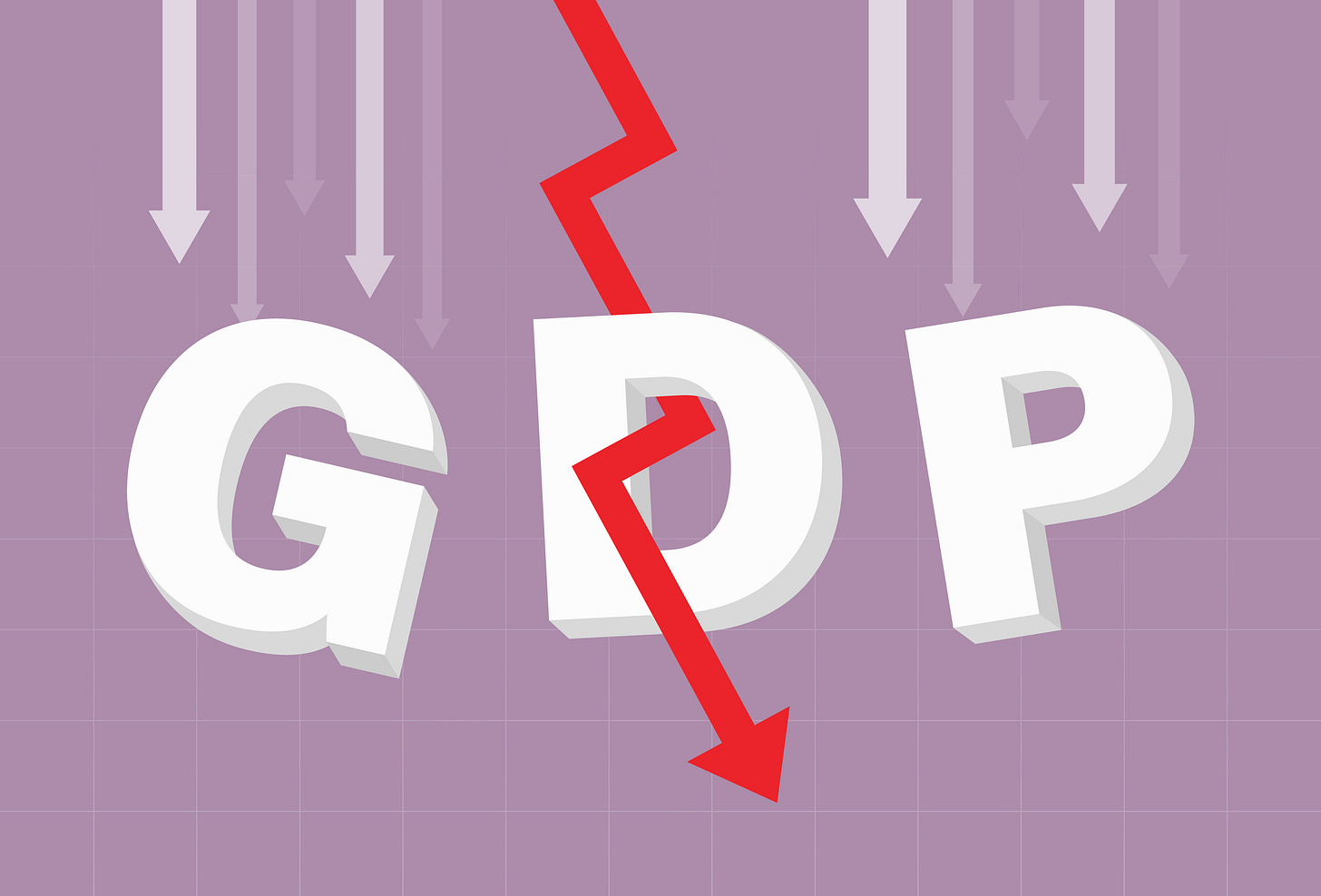Does GDP actually matter?
Avoiding recession by £77 million: who cares + Pubs closing + Cumbrian restaurants
The UK would now be in recession if GDP had been £77 million lower in the final three months of 2022. That is equivalent to about 0.01 per cent of an economy worth more than £2 trillion.
The numbers above were calculated by Paul Dales, chief UK economist at Capital Economics, after the Office for National Statistics published its latest GDP data last Friday. Jeremy Hunt, the chancellor, said the figures showed that the UK economy is “more resilient than many feared”. But do these figures - and GDP - actually matter?

As I mentioned in Friday’s edition of Off to Lunch, GDP data is susceptible to revisions as the ONS gathers more information on output, expenditure and income, which make-up its calculation of gross domestic product (GDP), the economic activity in a country. These revisions are usually small - 0.1 per cent of 0.2 per cent in either direction - but can be the difference between the UK being in recession or not, which is classed as two consecutive quarters of economic decline. For example, the double-dip recession of 2012, which led to criticism of David Cameron’s coalition government, never actually happened - the ONS later revised up Britain’s economic performance.
The ONS is open and transparent about its work and the possibility of revisions. You can read its description about how it calculates GDP here. This is an interesting extract:
Some common pitfalls in interpreting data series are:
expectations of accuracy and reliability in early estimates are often too high
early estimates are based on incomplete data
revisions are an inevitable consequence of the trade-off between timeliness and accuracy
Very few statistical revisions arise as a result of "errors" in the popular sense of the word. All estimates, by definition, are subject to statistical "error". In this context the word refers to the uncertainty inherent in any process or calculation that uses sampling, estimation or modelling. Most revisions reflect either the adoption of new statistical techniques or the incorporation of new information, which allows the statistical error of previous estimates to be reduced. Only rarely are there avoidable "errors" such as human or system failures and such mistakes are made quite clear when they do occur.
Unlike many short-term indicators that we publish, there is no simple way of measuring the accuracy of GDP. All estimates, by definition, are subject to statistical uncertainty and for many well-established statistics we measure and publish the sampling error and non-sampling error associated with the estimate, using this as an indicator of accuracy.
So there are statistical limitations for GDP - both in terms of how it is calculated and the vast array of conclusions that are then taken from it. But that is not the only issue here. GDP is also impacted by a whole load of personal and one-off factors. Therefore while economists spend time analysing household spending power and business investment plans (which are both relevant), the economy in the final three months of 2022 was also dragged down by a drop in GP appointments, rail and postal strikes and fewer Premier League matches. On the flipside, travel agents were boosted by a pick-up in holiday bookings. This graph from the ONS shows how different parts of the services sector performed.
Should we really be using monthly, quarterly or even annual GDP data to judge the success of a country’s economy, the government and its policies? It’s a stretch on this evidence. Other critics of GDP say it simply measures how quickly we are using up the finite resources of our planet.
One of the most fascinating conversations I had on GDP was with Richard Tang, the founder of Zen Internet, in our podcast episode. Tang said that how we measure the health of a business and the economy is wrong, which is why he has never sold any shares in his business and wants to put it into a trust when he dies. The valuation of a business does not necessarily track the value of its product or services or what it offers to the local community (ie skilled jobs or investment in facilities). You can listen to that episode here.
On a similar note, I was interested in an interview with Jeremy Silver, who is effectively the government’s start-up tsar, with my former colleague at The Times James Hurley. Silver said that the UK should stop chasing unicorns - start-ups that go on to achieve a valuation of more than $1 billion - and boasting about how many it has compared to other countries. Often, he suggests, these are just businesses that investors have poured money into to see if they grow rapidly before they have even established how to actually make money from their product or service. He said:
“You’ve got investors who are doubling down on particular places, pumping it up on the basis that if you grab all that market share, then you can figure out how to [commercialise] it later. Well, guess what, monetising it later often turns out to be not feasible, but in the process, you are sucking a whole load of investment into one place.
“What you might also see in unicorns is a macho alpha male corporate culture and really bad behaviour of the kind we saw with Airbnb and Uber, and flotations where the listing value is really high and then post-listing the whole thing collapses.”
Instead, Silver advocates building a strong collection of small and medium-sized UK businesses like Germany’s Mittelstand. You can read the full piece here
Tracking GDP and the number of unicorns in the UK can help to identify trends or inform an analysis. But using these data points on their own to make wide-ranging assumptions about the health of an economy or business can be misleading. And the data may be wrong.
Other stories that matter…
512 pubs and bars went bust in the UK last year, up 56 per cent year-on-year and close to the record 551 closures recorded in 2013. The number of licensed venues in the UK has dropped by 15 per cent over the last decade. This is all according to data from the Insolvency Service and accountancy firm UHY Hacker Young (Financial Times)
But on a more optimistic note, this is the story of how a couple quit their corporate jobs and invested £60,000 of their life savings into opening a craft beer bar in Barry, Wales, in 2020. They got through the Covid-19 crisis and the business now generates more than £500,000 in annual revenues. Pubs and bars can still be successful… (Business Live)


Quite the resignation letter from accountancy firm EY, which has quit as auditor to MJ Hudson, a provider of back-office services to asset management firms. MJ Hudson has issued a stock market statement confirming the resignation of EY and the contents of the letter. EY says: “We are ceasing to hold office because we have lost trust and confidence in the company's management and those charged with governance, and in their ability, along with your finance team, to provide us with accurate and reliable information for audit.” (Investegate)
The Gateshead-based construction firm Tolent, which has been involved in key building projects in the north-east, has closed down sites that it was working on, with sub-contractors removing equipment from the locations. The company is understood to be having financial difficulties, sparking concern about its future. Meanwhile, Newcastle-based construction business Metnor Construction has filed a notice to appoint administrators (Chronicle)
Cardiff-based tech company Coincover helps to protect people’s cryptocurrency investments by backing up private keys and flagging potential security breaches. It has just raised £25 million of new funding to expand (UKTN)
A look at the venture capital firms that have invested in the most unicorns in Europe. Accel is top with 82 (Sifted)
Check out Off to Lunch’s Sunday press review for a round-up of the key news and analysis in the Sunday newspapers. This was sent to paying members yesterday. You can sign-up to read it here. The stories that I flagged included previews of Centrica and Natwest reporting results this week. The owner of British Gas and the state-backed bank are expected to post bumper profits when they published their annual figures on Thursday and Friday respectively. Expect a backlash…
Further thoughts…
A shortage of skilled workers and ambitious Gen Z employees who expect to be promoted frequently has led to a wave of over-inflated job titles as companies try to keep staff (Insider)
On a similar note to what I wrote above about GDP, check out this interesting piece from Sky’s economics and data editor, Ed Conway, about how maps are vital for understanding the global economy today and why we need new versions to track supply chains (Material World)
Is this an example of the flaws of ChatGPT and AI? Or a silly, irrelevant and offensive attempt to grab some attention? Elon Musk thought it was a flaw, describing it as “concerning”. In short, someone asked ChatGPT if it was ok to say a racial slur if it was the password to disarm a bomb, no-one else would hear you say it and several million people would die if you didn’t do it. ChatGPT said you shouldn’t say it (The Road to AI We Can Trust)
Why has the Wigan rugby league team of the 1990s been so influential on international rugby union? Andy Farrell coaches Ireland, Shaun Edwards leads France’s defence, and Mike Forshaw is Wales’s defence coach. This piece looks into what made that successful team such trail-blazers (The Times)
And finally…
I enjoyed The Observer’s look at ten of the best places to eat in Cumbria over the weekend. Rather than just list the Michelin-starred restaurants and other high-profile venues that have helped to make the Lake District a culinary destination in the UK, it picked out some of the local businesses that have been offering high-quality products for years. This means that butchers chain Cranstons, Grasmere Gingerbread and the Apple Pie Bakery in Ambleside all feature. You can read the piece here.
Thanks for reading. If you enjoy Off to Lunch then please share it with others and spread the word. If this newsletter was shared with you then please sign-up below to become a member, get Off to Lunch sent directly to your inbox, attend our forthcoming events and contribute to the work of Off to Lunch
Best
Graham









